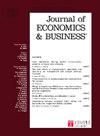Debt and debt tax benefit: Evidence from Indonesia debt-to-equity cap reform
IF 3.4
Q1 BUSINESS, FINANCE
引用次数: 0
Abstract
This study scrutinizes the effects of Indonesia’s 2016 debt-to-equity cap reform (thin capitalization rule) on capital structure, highlighting the role of debt tax benefits. The reform curtails debt tax benefits and furnishes a quasi-experimental setting, allowing a comparison between firms affected by the reform and those unaffected. Focusing on private firms and employing an entropy balancing weighted difference-in-difference approach, we elucidate that the reform results in a substantial 9.7 percentage point reduction in the debt ratio and a 5.3 percentage point increase in the stock ratio. Additionally, utilizing a pseudo tax cut reform framework combined with an isolated impact of the zero marginal debt tax benefit, we identify an implied tax elasticity of debt around 0.88, contributing to the observed decline in the debt ratio. Notably, smaller firms exhibit a more pronounced response, and the stock ratio undergoes a significant metamorphosis, suggesting the need for nuanced policy adjustments. Overall, the study underscores the profound influence of debt tax benefits in shaping corporate financing decisions.
债务和债务税益:印尼债转股上限改革的证据
本研究仔细研究了印度尼西亚 2016 年债务权益上限改革(薄资本化规则)对资本结构的影响,强调了债务税收优惠的作用。改革削减了债务税收优惠,提供了一个准实验环境,允许对受改革影响的企业和未受影响的企业进行比较。我们以私营企业为重点,采用熵平衡加权差分法,阐明了改革导致负债率大幅下降 9.7 个百分点,股票比率上升 5.3 个百分点。此外,利用伪减税改革框架和零边际债务税收优惠的孤立影响,我们发现债务的隐含税收弹性约为 0.88,这也是观察到的债务比率下降的原因。值得注意的是,规模较小的企业表现出更明显的反应,存货比率也发生了显著变化,这表明有必要进行细致的政策调整。总之,本研究强调了债务税收优惠对企业融资决策的深刻影响。
本文章由计算机程序翻译,如有差异,请以英文原文为准。
求助全文
约1分钟内获得全文
求助全文
来源期刊

JOURNAL OF ECONOMICS AND BUSINESS
BUSINESS, FINANCE-
CiteScore
6.20
自引率
2.60%
发文量
31
期刊介绍:
Journal of Economics and Business: Studies in Corporate and Financial Behavior. The Journal publishes high quality research papers in all fields of finance and in closely related fields of economics. The Journal is interested in both theoretical and applied research with an emphasis on topics in corporate finance, financial markets and institutions, and investments. Research in real estate, insurance, monetary theory and policy, and industrial organization is also welcomed. Papers that deal with the relation between the financial structure of firms and the industrial structure of the product market are especially encouraged.
 求助内容:
求助内容: 应助结果提醒方式:
应助结果提醒方式:


